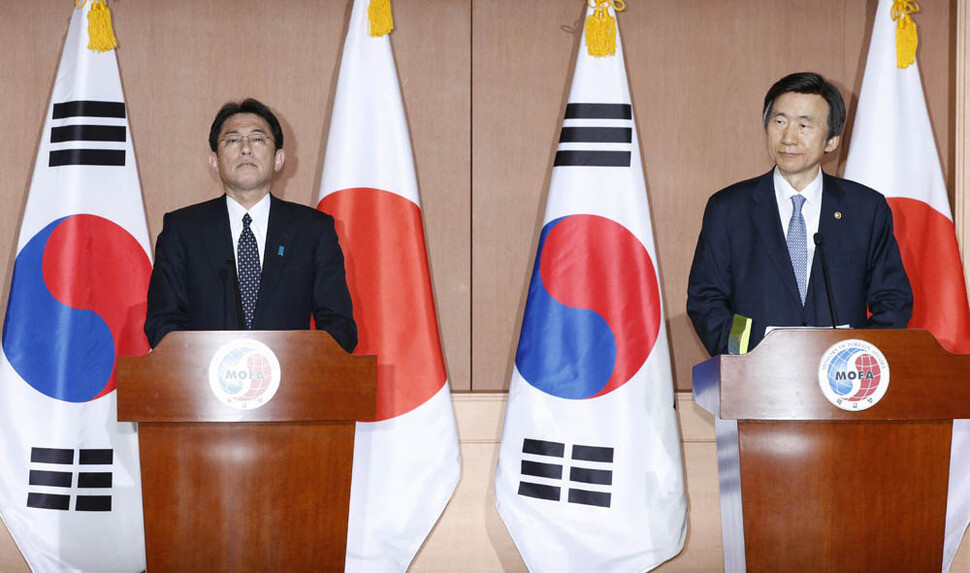hankyoreh
Links to other country sites 다른 나라 사이트 링크
Chief of Staff document says Seoul and Tokyo “sharply at odds” over comfort women

South Korean President Park Geun-hye’s chief of staff submitted a written opinion to the court stating that the issue of the comfort women for the Imperial Japanese Army is “a grave issue in which the positions and interests of the two countries [South Korea and Japan] are sharply at odds,” the Hankyoreh has learned.
The view expressed by President Park’s chief of staff conflicts with the official South Korean government position that the agreement reached by the two governments on Dec. 28 had “settled the comfort women issue as a diplomatic dispute.”
On June 1, Hankyoreh reporters acquired a letter that President Park’s chief of staff had written for an administrative lawsuit that South Korean civic group MINBYUN-Lawyers for a Democratic Society filed after the Blue House rejected the group’s request to publish the details of a telephone conversation between President Park and Japanese Prime Minister Shinzo Abe on Dec. 28, 2015.
The chief of staff had delayed writing the response but finally submitted it on May 31 after the court decided to hold the first hearing on June 8.
After explaining that “the comfort women issue has long been a sensitive issue about which South Korea and Japan have sharply disagreed,” the chief of staff wrote in the response that even today it is “a grave issue in which the positions and interests of the two countries are sharply at odds.”
This was why the content of the telephone conversation between the leaders of South Korea and Japan was not made public, the chief of staff said, citing “concerns that this could cause distinct harm to critical state interests.”
In the written opinion, the chief of staff provided two examples of the sharp difference of opinion between South Korea and Japan. The first example is that “the Japanese government denies the very fact that the comfort women were recruited by force,” and the second is that “the Japanese government’s position is that, even if it were responsible, all such responsibility was annulled by the agreement that the two countries reached in 1965 about economic cooperation and property claims.”
The views expressed by the chief of staff in this statement conflict with the official position that the South Korean government has repeatedly expressed about the significance and nature of the Dec. 28 agreement since that agreement was announced.
On Jan. 20, amid growing domestic and international controversy about the agreement, South Korea’s Ministry of Foreign Affairs posted a FAQ to its website in which it stated that “this agreement has settled the comfort women issue as a diplomatic dispute between South Korea and Japan.”
In addition, South Korean Foreign Minister Yun Byung-se and Japanese Foreign Minister Fumio Kishida used their joint press conference on Dec. 28, 2015 to “declare that an agreement has been reached,” in the words of he online FAQ.
Most importantly, the chief of staff‘s view that the two government’s positions are sharply at odds undercuts the legitimacy of the South Korean government’s efforts to quickly move forward with establishing the foundation to aid the comfort women as part of implementing the agreement. The establishment of the foundation presumes that the comfort women issue has been settled as a diplomatic dispute.
“The opinion submitted by President Park’s chief of staff shows that even the government acknowledges that the comfort women issue has not been resolved as a diplomatic dispute,” said Lee Sang-hui, the attorney for MINBYUN who is handling the lawsuit.
In sum, these sharply conflicting positions appear to explain why the South Korean and Japanese governments did not release a written agreement even as they boasted that the issue has been “finally and irreversibly resolved” as long as both sides faithfully implemented the agreement.
By Lee Je-hun, staff reporter
Please direct questions or comments to [english@hani.co.kr]

Editorial・opinion
![[Column] Season 2 of special prosecutor probe may be coming to Korea soon [Column] Season 2 of special prosecutor probe may be coming to Korea soon](https://flexible.img.hani.co.kr/flexible/normal/500/300/imgdb/original/2024/0426/3317141030699447.jpg) [Column] Season 2 of special prosecutor probe may be coming to Korea soon
[Column] Season 2 of special prosecutor probe may be coming to Korea soon![[Column] Park Geun-hye déjà vu in Yoon Suk-yeol [Column] Park Geun-hye déjà vu in Yoon Suk-yeol](https://flexible.img.hani.co.kr/flexible/normal/500/300/imgdb/original/2024/0424/651713945113788.jpg) [Column] Park Geun-hye déjà vu in Yoon Suk-yeol
[Column] Park Geun-hye déjà vu in Yoon Suk-yeol- [Editorial] New weight of N. Korea’s nuclear threats makes dialogue all the more urgent
- [Guest essay] The real reason Korea’s new right wants to dub Rhee a founding father
- [Column] ‘Choson’: Is it time we start referring to N. Korea in its own terms?
- [Editorial] Japan’s rewriting of history with Korea has gone too far
- [Column] The president’s questionable capacity for dialogue
- [Column] Are chaebol firms just pizza pies for families to divvy up as they please?
- [Column] Has Korea, too, crossed the Rubicon on China?
- [Correspondent’s column] In Japan’s alliance with US, echoes of its past alliances with UK
Most viewed articles
- 1Is Japan about to snatch control of Line messenger from Korea’s Naver?
- 2‘We must say no’: Seoul defense chief on Korean, USFK involvement in hypothetical Taiwan crisis
- 3[News analysis] Using lure of fame, K-entertainment agency bigwigs sexually prey on young trainees
- 4Will NewJeans end up collateral damage in internal feud at K-pop juggernaut Hybe?
- 5‘Weddingflation’ breaks the bank for Korean couples-to-be
- 6Division commander ordered troops to enter raging flood waters before Marine died, survivor says
- 7No good, very bad game for Korea puts it out of Olympics for first time since 1988
- 8“Korea is so screwed!”: The statistic making foreign scholars’ heads spin
- 9The dream K-drama boyfriend stealing hearts and screens in Japan
- 10[Column] The clock is ticking for Korea’s first lady